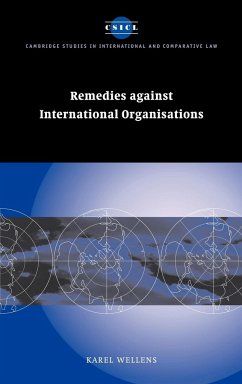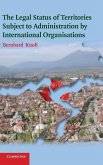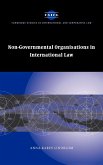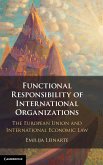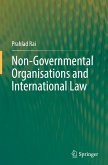International organisations have become major players on the international scene, whose acts and activities affect individuals, companies and states. Damage to interests or violation of rights sometimes occur (such as during peacekeeping operations, for example). Karel Wellens considers what remedies are available to potential claimants such as private contractors, staff members or, indeed, anyone suffering damage as a result of their actions. Can they turn to an Ombudsman or national courts, or do they have to rely on support by their own state? Are the remedies provided by international organizations adequate? Wellens' conclusions include suggestions for alternative remedial options in the future.
Table of contents:
Introduction; Part I. General Features of Remedies against International Organisations: 1. The accountability regime for international organisations; 2. Remedies against international organisations; 3. The different levels of accountability and the appropriateness of various remedies: scope ratione materiae; 4. Access to remedies; 5. Remedies against whom: the scope ratione personae respondenti; 6. The potential outcome of remedies: scope ratione remedii; Part II. Procedural Aspects of Remedial Action against International Organisations: 1. Procedural aspects of remedial action by member states; 2. Procedural aspects of remedial action by staff members; 3. Procedural aspects of remedial action by private claimants; 4. Procedural obstacles for representational non-governmental organisations; 5. Procedural obstacles common to remedial action by non-state claimants; Part III. Substantive Outcome of Remedial Action against International Organisations: 1. General features of remedial outcome; 2. Remedial outcome for staff members; 3. Remedial outcome for private claimants; Part IV. Alternative Remedial Action against International Organisations and Options for the Future: 1. Pre-remedial action; 2. Non-legal alternative remedial action; 3. Commissions of inquiry; 4. Amendment of existing judicial remedies; 5. An inevitable role of the International Court of Justice; Conclusion.
International organisations are major players on the international scene, whose acts and activities affect individuals, companies and states. Damage to interests or violation of rights sometimes occur (such as during peacekeeping operations). Are the remedies provided by international organizations adequate? Wellens' study includes suggestions for alternative remedial options.
A consideration of the legal remedies available to victims of actions by international organizations.
Hinweis: Dieser Artikel kann nur an eine deutsche Lieferadresse ausgeliefert werden.
Table of contents:
Introduction; Part I. General Features of Remedies against International Organisations: 1. The accountability regime for international organisations; 2. Remedies against international organisations; 3. The different levels of accountability and the appropriateness of various remedies: scope ratione materiae; 4. Access to remedies; 5. Remedies against whom: the scope ratione personae respondenti; 6. The potential outcome of remedies: scope ratione remedii; Part II. Procedural Aspects of Remedial Action against International Organisations: 1. Procedural aspects of remedial action by member states; 2. Procedural aspects of remedial action by staff members; 3. Procedural aspects of remedial action by private claimants; 4. Procedural obstacles for representational non-governmental organisations; 5. Procedural obstacles common to remedial action by non-state claimants; Part III. Substantive Outcome of Remedial Action against International Organisations: 1. General features of remedial outcome; 2. Remedial outcome for staff members; 3. Remedial outcome for private claimants; Part IV. Alternative Remedial Action against International Organisations and Options for the Future: 1. Pre-remedial action; 2. Non-legal alternative remedial action; 3. Commissions of inquiry; 4. Amendment of existing judicial remedies; 5. An inevitable role of the International Court of Justice; Conclusion.
International organisations are major players on the international scene, whose acts and activities affect individuals, companies and states. Damage to interests or violation of rights sometimes occur (such as during peacekeeping operations). Are the remedies provided by international organizations adequate? Wellens' study includes suggestions for alternative remedial options.
A consideration of the legal remedies available to victims of actions by international organizations.
Hinweis: Dieser Artikel kann nur an eine deutsche Lieferadresse ausgeliefert werden.

